新概念一册第71课
新概念一册-71课
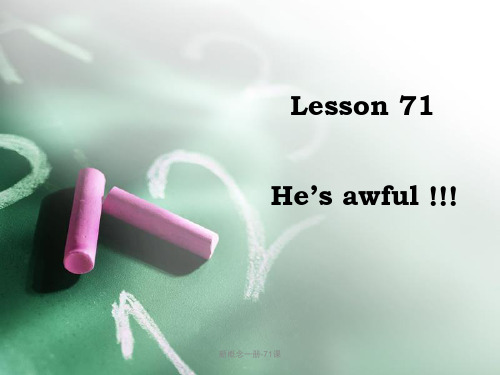
新概念一册-71课
一般过去时的构成: 陈述句: He arrived home at six o’clock yesterday evening.
We were students three years ago. 一般疑问句: Did he telephone you four times? 肯定回答: Yes, he did 否定回答: No, he didn’t=No, he did not. 特殊疑问句:
她昨天给我打了四次电话.
She telephoned me four times yesterday.
新概念一册-71课
新概念一册-71课
新概念一册-71课
新概念一册-71课
新概念一册-71课
新概念一册-71课
★ answer v. 接(电话)
answer the door/doorbell 应声开门 Mary took a few minutes to answer the door.
新概念一册-71课
finally 和last 的区别: Finally “最后”,adv. 常放在句首, e.g. Finally, she is tired but happy. 最后,她很累但是很开心。 Last “最后的”,adj. 后面可以加名词, e.g. He is the last one to leave the classroom. 他是最后一个离开教室的。
新概念一册-71课
last adj. 最后的,前一个
last week/ month/ year at last 最后
e.g. At last, put some sugar in your coffee. 最后在你的咖啡里加一些糖。 have the last word 说的算
新概念英语第一册第71-72课He’sawful内容讲解

新概念英语第一册第71-72课He’sawful内容讲解新概念英语第一册第71-72课He’s awful内容讲解导语:大家应该都有过讨厌别人或被别人讨厌的时候,下面是一篇关于这方面的英语课文,欢迎阅读。
Lesson 71 He's awful!他讨厌透了!Listen to the tape then answer this question.How did Pauline answer the telephone at nine o'clock?听录音,然后回答问题。
波淋在9点接电话时是如何说的?Jane : What’s Ron Marston like , Pauline ?简:罗恩.马斯顿是怎样一个人?Pauline : He’s awful ! He telephoned me four times yesterday , and three times the day before yesterday.波淋:他讨厌透了!他昨天给我打了4次电话前天打了3次。
Pauline: He telephoned the office yesterday morning and yesterday afternoon. My boss answered the telephone .波淋:他昨天上午和下午把电话打到了我的办公室,是我的老板接的。
Jane : What did your boss say to him ?简:你老板是怎么对他说的?Pauline: He said ,”Pauline is typing letters .She can’t speak to you now !”波淋:他说:“波淋正在打信,她现在不能同你讲话!”Pauline : Then I arrived home at six o’clock yesterday evening .He telephoned again .But I didn’t answer the phone !波淋:后来,我昨晚6点钟回到家里。
最新新概念英语第一册第71课Lesson71课文单词知识点
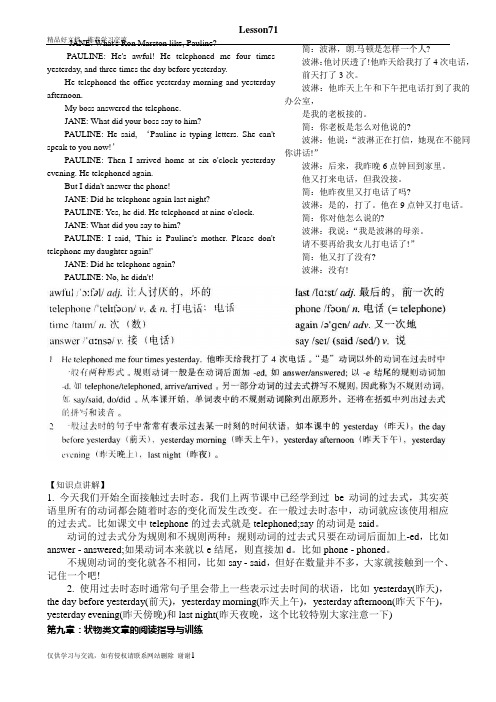
精品好文档,推荐学习交流【知识点讲解】1. 今天我们开始全面接触过去时态。
我们上两节课中已经学到过be 动词的过去式,其实英语里所有的动词都会随着时态的变化而发生改变。
在一般过去时态中,动词就应该使用相应的过去式。
比如课文中telephone 的过去式就是telephoned;say 的动词是said 。
动词的过去式分为规则和不规则两种:规则动词的过去式只要在动词后面加上-ed ,比如answer - answered;如果动词本来就以e 结尾,则直接加d 。
比如phone - phoned 。
不规则动词的变化就各不相同,比如say - said ,但好在数量并不多,大家就接触到一个、记住一个吧!2. 使用过去时态时通常句子里会带上一些表示过去时间的状语,比如yesterday(昨天),the day before yesterday(前天),yesterday morning(昨天上午),yesterday afternoon(昨天下午),yesterday evening(昨天傍晚)和last night(昨天夜晚,这个比较特别大家注意一下)第九章:状物类文章的阅读指导与训练Lesson71JANE: What's Ron Marston like, Pauline?PAULINE: He's awful! He telephoned me four times yesterday, and three times the day before yesterday.He telephoned the office yesterday morning and yesterday afternoon.My boss answered the telephone.JANE: What did your boss say to him?PAULINE: He said, ‘Pauline is typing letters. She can't speak to you now!’PAULINE: Then I arrived home at six o'clock yesterday evening. He telephoned again. But I didn't answer the phone!JANE: Did he telephone again last night?PAULINE: Yes, he did. He telephoned at nine o'clock. JANE: What did you say to him?PAULINE: I said, 'This is Pauline's mother. Please don't telephone my daughter again!'JANE: Did he telephone again? PAULINE: No, he didn't!简:波淋,朗.马顿是怎样一个人?波淋:他讨厌透了!他昨天给我打了4次电话, 前天打了3次。
新概念英语第一册71课课文
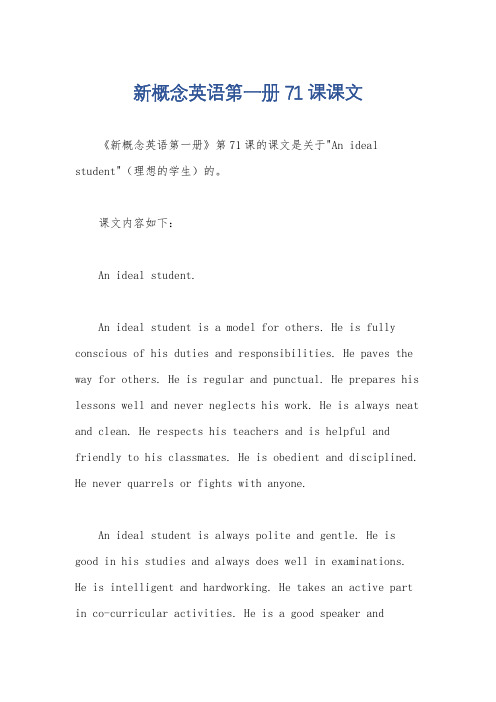
新概念英语第一册71课课文《新概念英语第一册》第71课的课文是关于"An ideal student"(理想的学生)的。
课文内容如下:An ideal student.An ideal student is a model for others. He is fully conscious of his duties and responsibilities. He paves the way for others. He is regular and punctual. He prepares his lessons well and never neglects his work. He is always neat and clean. He respects his teachers and is helpful and friendly to his classmates. He is obedient and disciplined. He never quarrels or fights with anyone.An ideal student is always polite and gentle. He is good in his studies and always does well in examinations. He is intelligent and hardworking. He takes an active part in co-curricular activities. He is a good speaker anddebater. He is also good in sports and games. He is a well-rounded personality.An ideal student is ambitious and has a clear vision of his future. He sets goals for himself and works hard to achieve them. He is focused and determined. He knows the importance of education and strives for excellence in his academic pursuits. He is self-motivated and never gives up easily.An ideal student is not only concerned about his own growth but also about the welfare of others. He is kind and compassionate. He helps those in need and participates in social service activities. He is aware of the issues and challenges faced by society and actively contributes to its betterment.In conclusion, an ideal student is a role model for others. He possesses qualities like discipline, dedication, intelligence, and compassion. He strives for excellence in all aspects of life and works towards personal growth as well as the betterment of society.以上是《新概念英语第一册》第71课的课文内容。
新概念1第71课

构成2:行为动词,表示过去某一时间发生的动作
行为动词变一般过去时的构成
1.一般在动词后直接加-ed
answer-answered wait---waited
2.以不发音的e结尾的动词直接加_dtelephone---telephoned arrive---arrived
3.以辅音加y结尾的,把y改为i,再加ed empty--emptied
2.对……作出反应;响应
answer the phone/telephone
接电话
answer the door/doorbell
应声开门
Mary took a few minutes to answer the door. 玛丽拖了几分钟时间才去开门。
n. 答案 ,办法 Do you know the answer to Question 10? 你知道问题10的答案吗? This is the only answer to this problem. 这是解决这个问题的唯一办法。
2.speak to sb. 与某人说话 May I speak to Pauline, please? I'd like to speak to Pauline, please. 在电话中回答:This is….
一般过去时 II
概念:过去时间发生的动作或存在的状态。
构成1:be动词,表示过去时间存在的状态 be 的过去式是was 和were,was 用于第一人称和第三人称单数,were用于其他人称, 如:We were there at four o'clock.(P140) Were you at the butcher's?(P133) I was at home on Saturday.(P136)
新概念第一册71课课文
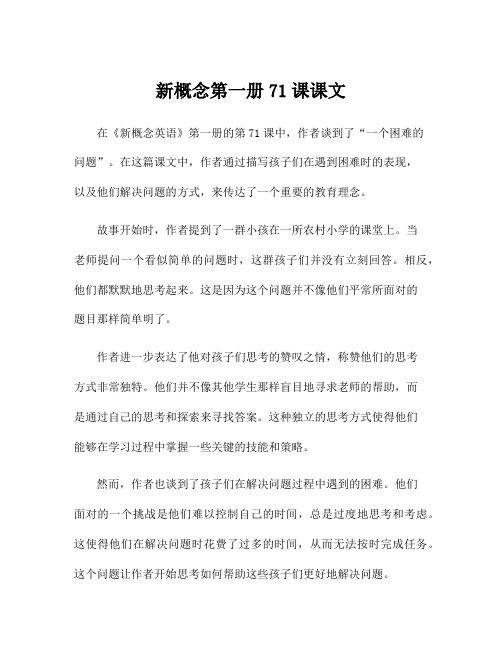
新概念第一册71课课文在《新概念英语》第一册的第71课中,作者谈到了“一个困难的问题”。
在这篇课文中,作者通过描写孩子们在遇到困难时的表现,以及他们解决问题的方式,来传达了一个重要的教育理念。
故事开始时,作者提到了一群小孩在一所农村小学的课堂上。
当老师提问一个看似简单的问题时,这群孩子们并没有立刻回答。
相反,他们都默默地思考起来。
这是因为这个问题并不像他们平常所面对的题目那样简单明了。
作者进一步表达了他对孩子们思考的赞叹之情,称赞他们的思考方式非常独特。
他们并不像其他学生那样盲目地寻求老师的帮助,而是通过自己的思考和探索来寻找答案。
这种独立的思考方式使得他们能够在学习过程中掌握一些关键的技能和策略。
然而,作者也谈到了孩子们在解决问题过程中遇到的困难。
他们面对的一个挑战是他们难以控制自己的时间,总是过度地思考和考虑。
这使得他们在解决问题时花费了过多的时间,从而无法按时完成任务。
这个问题让作者开始思考如何帮助这些孩子们更好地解决问题。
在接下来的一段中,作者提到了一个解决这个问题的方法。
他鼓励孩子们在解决问题时,要学会分析问题的本质,而不是陷入琐碎的细节中。
这样一来,他们可以更快地抓住问题的要点,并能够迅速找到解决问题的方法。
作者还引用了一个心理学家的观点,指出对问题本质的分析和理解是解决问题的关键所在。
最后,作者总结了这个困难问题的教育价值。
他认为,通过遇到困难问题、思考,并试图解决它们,孩子们不仅能够培养独立思考和解决问题的能力,还能够培养他们的兴趣和动力。
这样一来,他们就能更好地应对日后生活中遇到的挑战。
总的来说,第71课的《一个困难的问题》告诉了我们,教育不仅是为了灌输知识,还应该培养学生的思考能力和解决问题的能力。
通过鼓励学生们独立思考、分析问题本质,我们可以帮助他们在面对困难时更加自如地应对,并培养他们未来生活中所需的技能和策略。
这个课文也向我们传达了一个非常重要的教育理念:教育的目的不仅仅是为了教会孩子们掌握知识,还要培养他们的智力、思考能力和解决问题的能力,以应对未来的挑战。
新概念英语第一册第71课

A. played
B. plays
C. playing
2 I played basketball in the playground __________ weekend.
A. last
B. next
C. this
3 Did Rose __________ last Sunday?
A. went swimming B. read a book
C. taking pictures
• 5. Last week I read an English book.
• 否定句: __________________________________________
• 一般疑问句: ________________________________________
say (said ) V. 说
你跟她说什么了? What did you say to her ? Can I go ,Mum?Please say yes!
speak with sb (spoke) Can I speak with you for a minute?
Reading Time
farm last week.
• 5. Tom and Mary ___________ (come) to China last month.
• 6. Mike _________________(not go) to bed until 12 o’clock last night.
• 7 So he ______ (get ) up late.
awful adj. 让人讨厌的,坏的
• The weather was awful. • It is a really awful book. • You look awful , what's wrong with you ? • Alice is awful!
新概念英语第一册第71课一般过去时ppt课件
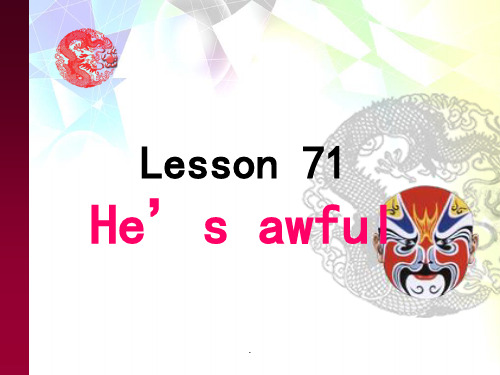
answer. • a telephone box
.
time n. 时间,次数
• once 一次 twice 两次 • three times 三次 四次 four times
• Time goes by so quickly these days. • 我们一个月看他三次。 • We visit him three times a month . • It's time to do sth. • It's time to go home.
Lesson 71
He’s awful
.
• awful 让人讨厌的 • telephone 打电话 • time 次数 • answer 接电话 • last 最后,上一个 • phone 电话 • again 又一次地 • say 说
• say the poem aga. in
Key words:
.
answer v./n. 接(电话),回答
• What is the answer to the question?
• 她了吗? • answer thetelephone • 接电话
.
phone n. 电话
.
again adv. 又一次
• once again 再来一次 • again and again 一次又一次 • Can you say it again?
• I will never go there again. • 他昨天又给你打电话了吗? • Did he telephone you again
yesterday? .
新概念英语1Lesson_71
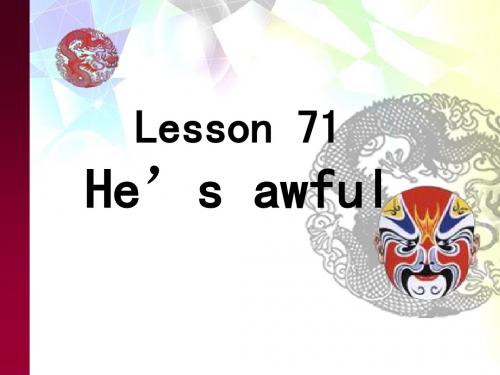
New words:
★ time ① n. 可数名词表示次(数) ● once 一次 ● twice两次 ● three times 三次(≥3数词+times) He telephoned me four times yesterday. 他昨天给我打了四次电话。 ② n. 不可数名词表示时间 ● on time 按时,准时 ● in time 及时 ● all the time 一直 ●once upon a time 很久很久以前
Lesson 71
He’s awful
New words:
★ awful adj. 让人讨厌的,坏的 He’s awful/terrible.他讨厌透了。 The weather is awful 天气糟糕透了。
New words:
★ telephone ① v. 打电话 call、phone、ring也表示打电话的意思。 He telephoned me four times yesterday. 他昨天给我打了四次电话。
New words:
★ say ① v. 说 What did you say to him? 你对他怎么说的? ●said 过去式
② v.说,say、speak、tell、talk的区别 ●say to sb.对某人说 ●speak to sb. 与某人说话(常用于打电话) ●speak 某种语言,speak English ●tell sth. to sb.告诉某人某事 ●talk sth. with sb.与某人谈论某事
Notes on the text:
新概念英语第一册第71课71440
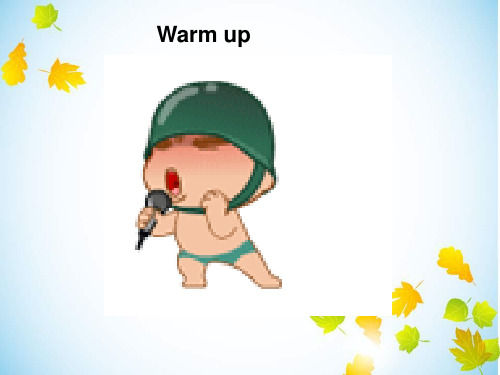
一般过去时的练习
air----aired clean---cleaned open---opened
sharpen---sharpened turn on---turned on
Listen---listened boil---boiled arrive----arrivedΒιβλιοθήκη play---played
例如:What are you talking about? 你们正在谈论什么? say 指说的具体内容,后面可接to sb.,指对某人说。 例如:Please say it again. 请把它再说一遍。 “Go out!” she said to me angrily. “滚出去!”她生气地对我说。 speak 指说某种语言,后面可以接to sb.,指和某人说话 例如:I can speak Japanese. 我会说日语。 May I speak to Mr. Black? 我可以和Black 先生说话吗? tell 主要是指告诉,短语:tell sb. sth. = tell sth. to sb. 告诉某人某 事
Warm up
Lesson 71 He’s awful!
key points
I.Key words
1 awful ['ɔ:ful] ad.让人讨厌的,坏的 2 telephone ['telifəun] v.& n.打电话 3 time [taim] n.次(数) 4 answer ['ɑ:nsə] v.接(电话) 5 last [lɑ:st] a.最后的,前一次的 6 phone [fəun] n.电话(=telephone) 7 again [ə'gein] ad.又一次地 8 say [sei] v.说
新概念第一册71课PPT课件
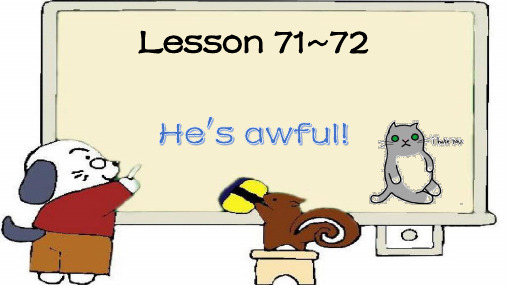
e.g. 我不记得他的电话号码。 I can't remember his telephone number.
time
n. 时间(不可数)
e.g. 你现在有时间吗? Do you have time now?
e.g. 我没时间做它。 I have no time to do it.
n. 次数(可数) 基数词+times 表示几次(两次以上)
一次 两次 三次 六十次
oHale Waihona Puke e timetwo times
three times
sixty times
once twice
序数词+time 表示第几次
the first time the second time the third time
all the time I looked for my book everywhere, and it was in my bag all the time.
Hello. Who is that? /Who is calling,please?
I'm Yvonne. Are you Lucy? This is Yvonne(speaking). Is that Lucy?
学习总结
经常不断地学习,你就什么都知道。你知道得越多,你就越有力量 Study Constantly, And You Will Know Everything. The More
You Know, The More Powerful You Will Be
结束语
当你尽了自己的最大努力时,失败也是伟大的, 所以不要放弃,坚持就是正确的。
When You Do Your Best, Failure Is Great, So Don'T Give Up, Stick To The End 演讲人:XXXXXX 时 间:XX年XX月XX日
新概念英语第一册lesson 71课件

Seven times
• 2.Who answered the phone yesterday afternoon ?
Pauline’s boss
• 3.What did her boss say to Ron Marston?
Pauline is typing letters. She can’t speak to you now . • 4. Did Pauline’s mother say to Ron
• • • • • • • • • • • • • • • • •
完形填空思维训练之二:动词训练 JANE : What's Ron Marston like, Pauline? PAULINE: He's awful! He _____ me four times yesterday, and three times the day before yesterday. He _____ the office yesterday morning and yesterday afternoon. My boss _____ the telephone JANE : What _____ your boss _____ to him? PAULINE: He _____, "Pauline _____ _____ letters. She can’t _____ to you now!" Then I _____ home at six o'clock yesterday evening. He _____ again. But I _____ _____ the phone! JANE : _____ he _____ again last night? PAULINE: Yes, he _____. He _____ at nine o'clock. JANE : What _____ you _____ to him? PAULINE: I _____, 'This _____ Pauline's mother. Please _____ _____ my daughter again!' JANE : _____ he _____ again?
新概念一册第71PPT课件

• 4.The girls are playing on the playground.
(就划线部分提问)
• 5.They are cleaning their classroom.
(对划线部分提问)
• 6 Tom does homework every day.
(用now替换画线部分) .
14
• 在电话中回答:This is…. • pretend as 假装
She pretended herself as her mother.
.
12
• 简:波淋,朗.马顿是怎样一个人? • 波淋:他讨厌透了!他昨天给我打了4次电话前天打了3次。 • 波淋:他昨天上午和下午把电话打到了我的办公室,是我的老板
• JANE: Did he telephone again?
• PAULINE: No, he didn't!
.
10
课文讲解
• What's Ron Marston like, Pauline? What is sb. like? 询问某人的外貌或品行。 你爸爸这个人怎么样? What's your father like?
• PAULINE: Yes, he did.
•
He telephoned at nine o'clock.
• JANE: What did you say to him?
• PAULINE: I said, 'This is Pauline's mother.
Please don't telephone my daugmorning and yesterday afternoon. My boss answered the telephone. • JANE: What did your boss say to him? • PAULINE: He said, "Pauline is typing letters. • She can't speak to you now!"
新概念第一册第71课(课堂PPT)

其他语言点
answer the phone 接电话 He telephoned me yesterday. 打电话给某人 He telephoned the office yesterday. 给办公室打电话
21
其他语言点
This is Pauline’s mother. 我是… This is Susan. This is Susan speaking. Who is calling? 你是谁?
34
看电视 昨天晚上
When did they watch TV? They watched TV last night.
35
复习 review
daily expression
规则动词的过去式
there be
What is 某人 like?
they are…
36
37
7
翻译练习
TOM是怎样一个人? 他讨厌透了. 他昨天给我打了4次电话. 前天打了3次. 他又打了没有? 没有
8
一般过去时
概念:表示过去某一时间发生的动作 或存在的状态,通常以动词的过去式 表示,其否定句和各种疑问句靠助动 词did构成。
9
一般过去时
1.一般在动词后直接加-ed) answer-answered wait-waited
did +主语+动词原形+其它?句末用问号。 肯定回答:Yes, …did. 否定回答:No, …didn’t.
➢Did he telephone you four times yesterday? ➢Yes, he did . / No, he didn’t.
12
一般过去时
4.) 特殊疑问句: 特殊疑问词+ did +主语+动词原形+其 它?句末用问号。
新概念一册71课

v.回答;答复 请回答我的问题。 Please answer my question.
Notes
1.What's Ron Marston like, Pauline?波琳, 朗· 马斯顿是怎样一个人? 〖分析〗what引导的特殊疑问句 〖注释〗What is sb. like? 用来询问某人的外貌或品行
Lesson 71 He's awful !
New Words
awful adj.让人讨厌的,坏的 telephone v. n. 打电话;电话 time n.次(数) answer v. 接(电话) last adj.最后的,前一次的 phone n. 电话 (= telephone) again adv. 又一次地 say (said, said) v. 说
eg: 一次 once 两次 twice 三次或三次以上:用基数词+times eg: 第三次 three times 第四次 four times
3.He said, "Pauline is typing letters. She can't speak to you now."他说:“波琳正在 打信,她现在不能接你电话。” 〖分析〗这是一个直接引语,said后面接说 话的内容形式不作变化; 〖注释〗speak to sb. 与某人谈话 打电话的时候可以说“我可以跟杰克讲话 吗?”: May I speak to Jack, please?
〖例句〗她丈夫是怎样一个人? What is her husband like?
2.He telephoned me four times yesterday, and three times the day before yesterday.
新概念第一册第71课

Listen
to the tape and answer the question: How did Pauline answer the telephone at nine o’clock? 071&072-He's Awful.mp3
6
Awful Telephone/ phone Time Answer Last Phone Again say
4
他周二没来上学. He was absent from school on Tuesday. 他周日在教堂. He was at church on Sunday. TOM周六在理发店. Tom was at the hairdresser’s on Saturday.
5
10
1.) 肯定句:主语+动词过去式+其它
如:He telephoned me four times yesterday.
2.) 否定句:主语+didn’t+动词原形+其它 如:He didn’t telephone me four times
yesterday.
11
3.) 一般疑问句及其回答:
32
洗衣服 昨天早晨
When did she wash the clothes? She washed the clothes yesterday morning.
33
出租车来了 昨天下午
When did the taxi arrive? It arrived yesterday afternoon.
The day before yesterday The day before yesterday in the morning
- 1、下载文档前请自行甄别文档内容的完整性,平台不提供额外的编辑、内容补充、找答案等附加服务。
- 2、"仅部分预览"的文档,不可在线预览部分如存在完整性等问题,可反馈申请退款(可完整预览的文档不适用该条件!)。
- 3、如文档侵犯您的权益,请联系客服反馈,我们会尽快为您处理(人工客服工作时间:9:00-18:30)。
ped
将下列单词变为动词过去式形式
ask - asked
want- wanted empty- emptied
clean- cleaned arrive- arrived slip - slipped stay - stayed
telephoneplayshaverainopenstelephoned her three times
yesterday.
2.Her mother answered the telephone.
3.The man is awful.
yesterday
n.昨天
the day before yesterday前天
before
prep.在….之前
answer v.回答
answer the phone 接电话
speak v.讲(动作)
speak to sb. 与…讲话 speak + 语言
/ə’ gen/
again
adv.再,又
Lesson 71
He’s awful!
What’ the orange like? A. good B. better C. awful
time n.次数
How many times did the orange call the apple?
A.5 times B.3 times C.many times (很多次)
telephoned played shaved rained opened sharpened listened to
读音问题
1. 在清辅音后,读/t/ asked / a:skt /
2. 在元音,浊辅音后,读/d/ cleaned / kli:nd /
3. 在t和d后,读/id/
wanted / ‘wɔntid /
一般过去时
1.概念:表示过去某时发生的动作或情况,多
数情况下,句中要有一个表示过去的
具体时间。
2.构成:主语 + v.过去式 + 时间状语
3.v.过去式变化规则:
(1)直接+ed
answer- ed
(2)以e结尾的只+d
telephone- d
(3)重读,一元+一辅,双辅+ed drop- ped
(4)辅音+y结尾,把y变i+ed empty- emptied
Exercises:
air
ed
clean
ed
open
ed
sharpen
ed
play
ed
listen
ed
boil
ed
arrive
d
study
ied
hurry
ied
live
d
wash
ed
enjoy
ed
empty ied
call
ed
stop
